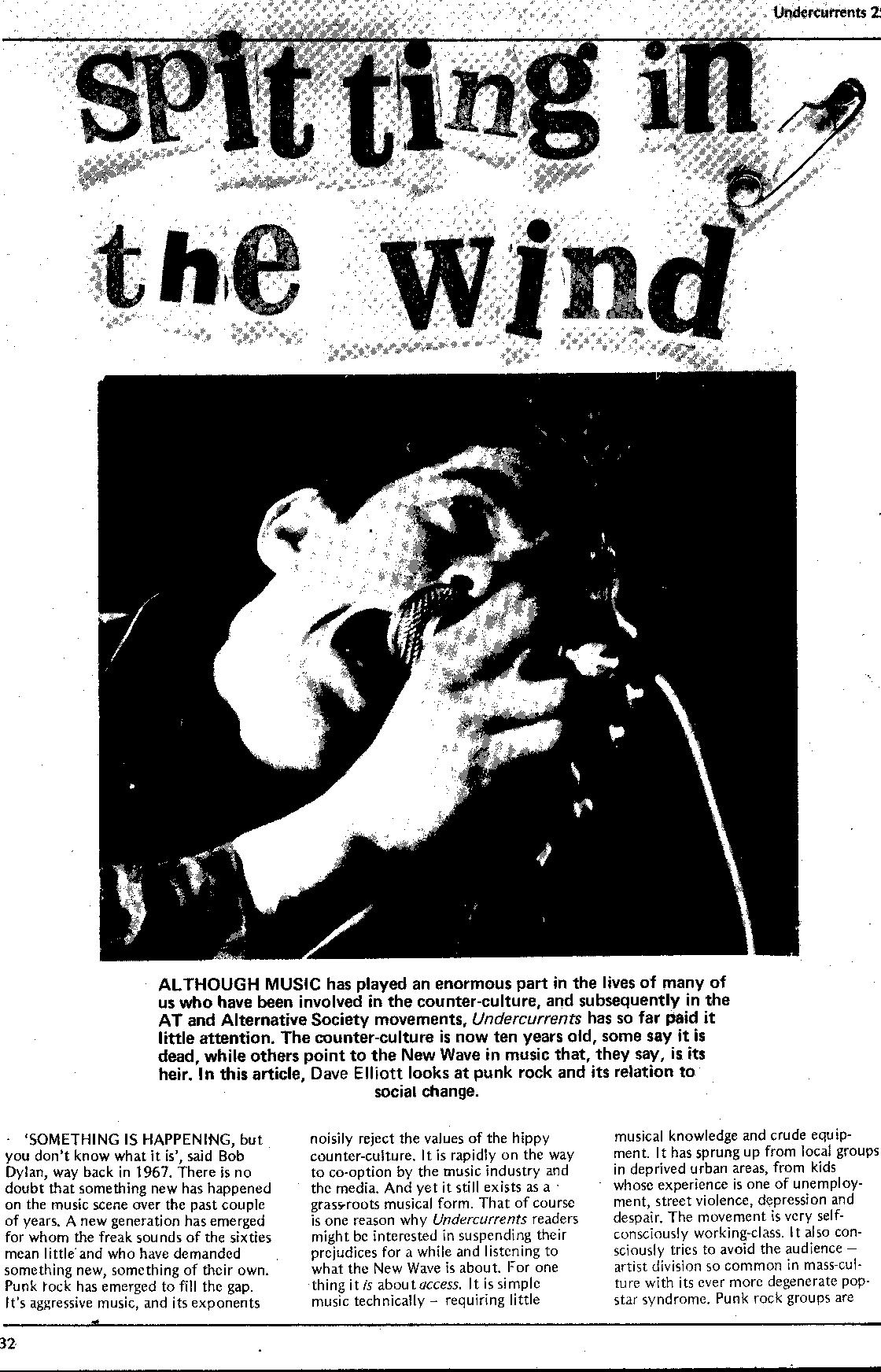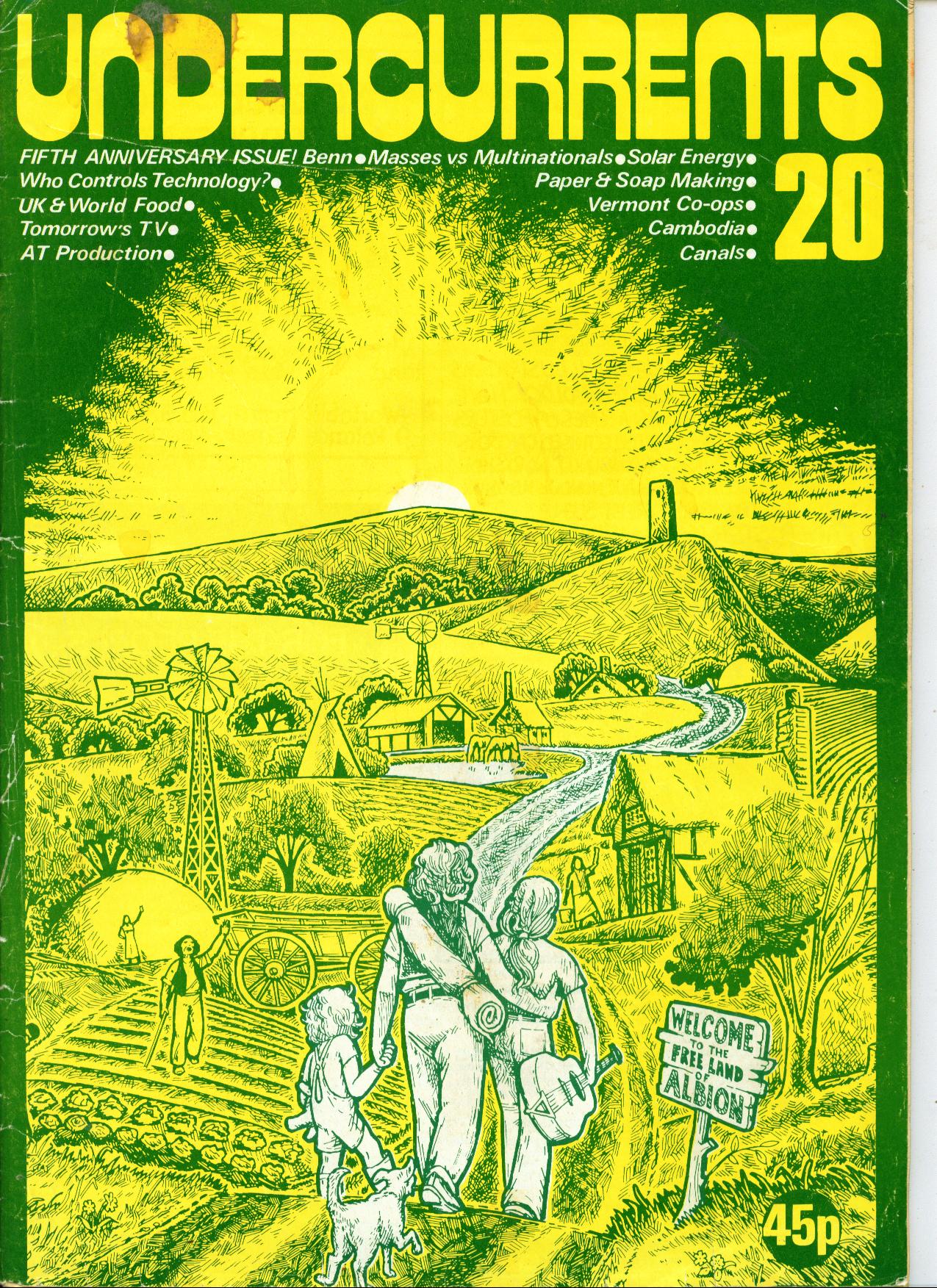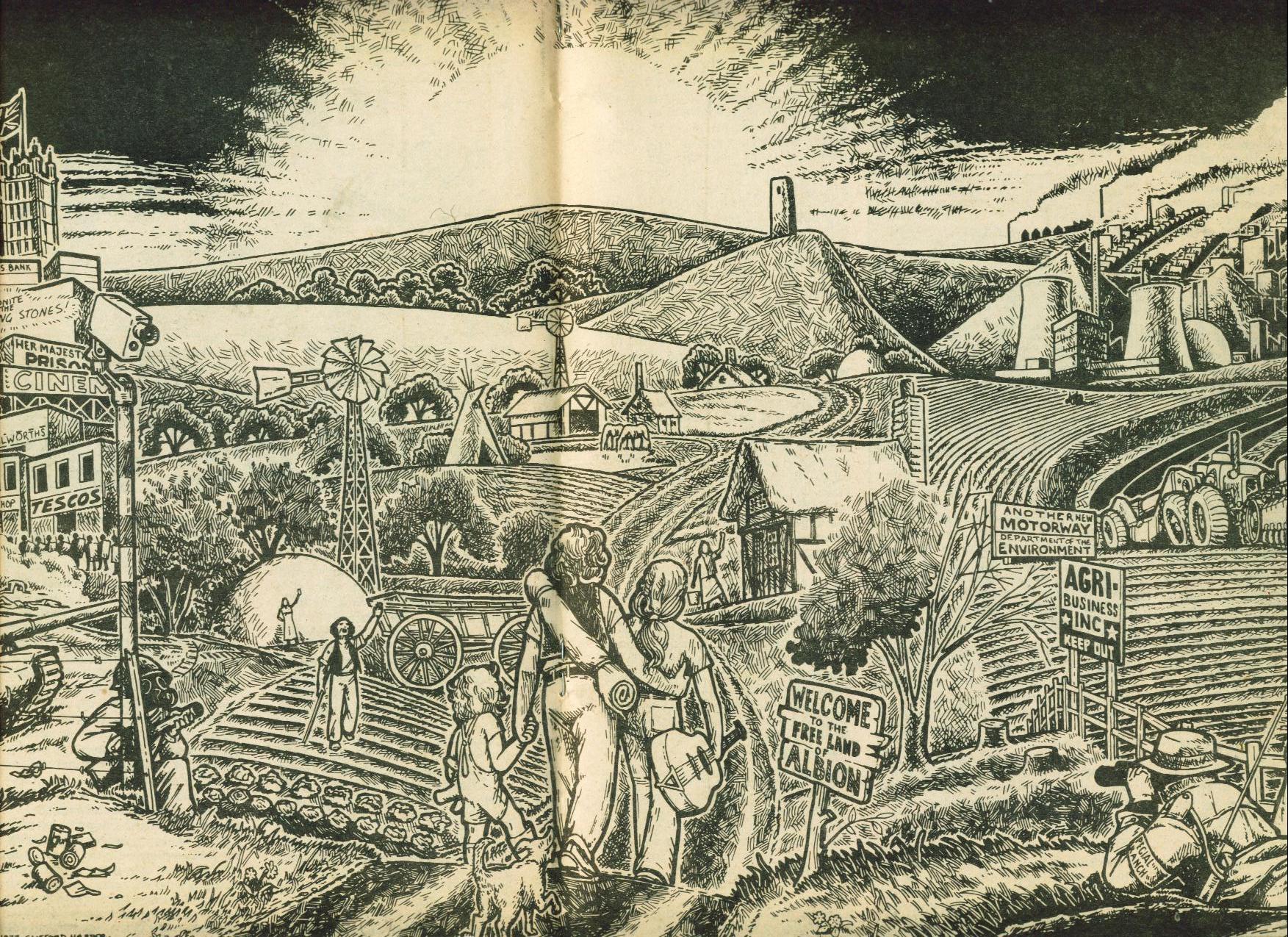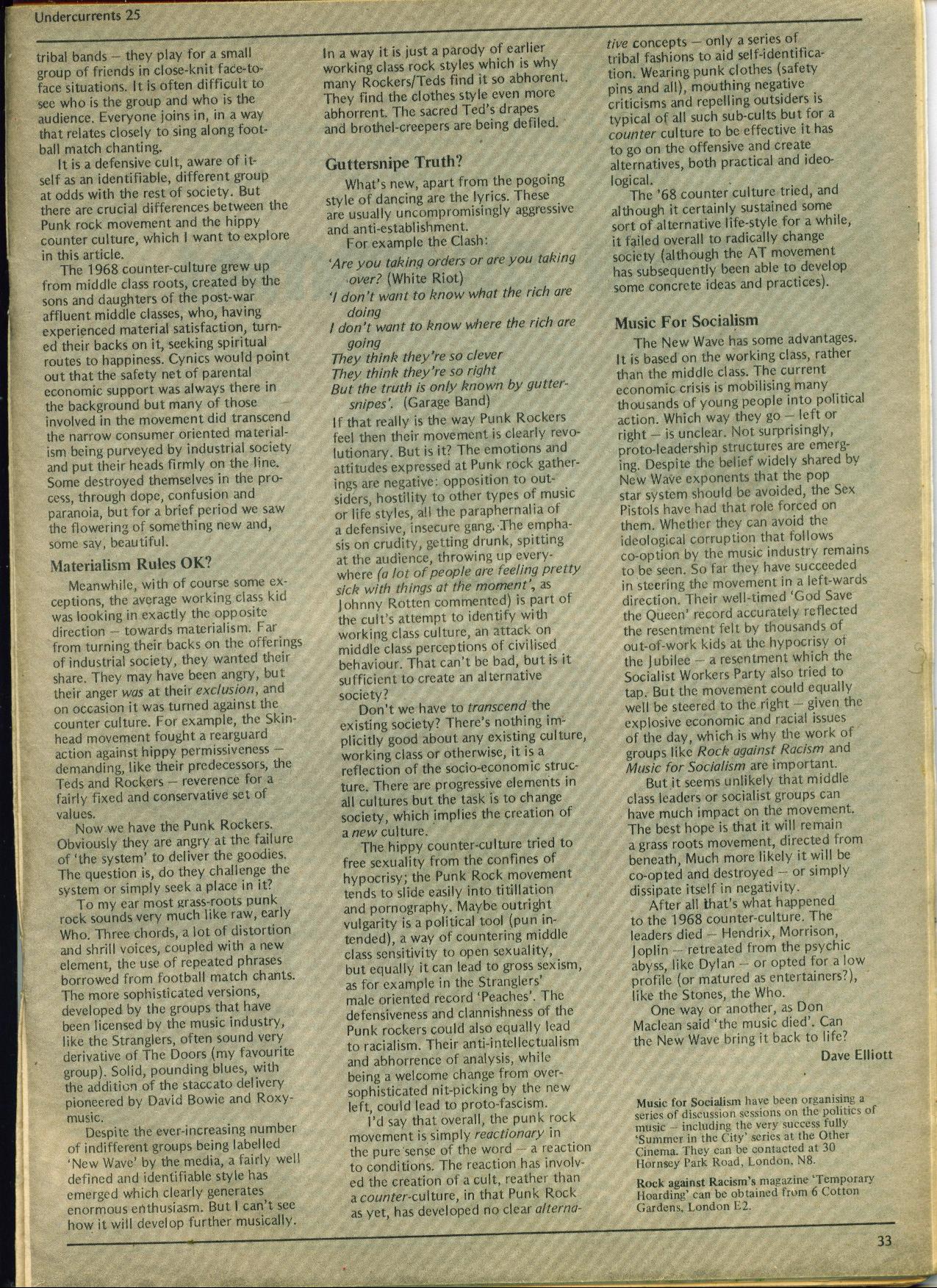This is by way of an answer to years of (hippies were) crap. Main feature, which may not be very legible is an article from Undercurrents magazine No. 26 December 1977/ January 1978 and was their response to punk.
Undercurrents was a UK based magazine which ran from 1972 to 1981 and focussed on what they called ‘radical technology’ (windmills, solar power, pirate radio, organic farming, communes and general greenery) plus radical politics of a reddish green mixed with a touch of black… but before ‘green’ had its present meaning.
Blah blah blah. What I will do is type up the punk piece so it is legible. meanwhile, here are some pics.





betab
February 13, 2008 at 10:12 amThere’s some very strange synergistic weirdness going on here. Nowadays I’m a sociology lecturer and I’ve just sent my students (who are studying social movements) off to go and read Undercurrents to see an example of how all sorts of countercultural stuff crossed over, intermixed and was in dialogue rather than in separate silos.
Definately think countercultural is a useful term.
alistairliv • Post Author •
February 13, 2008 at 9:51 pmBetab – what do your students make of Undercurrents? Hang on, we have run out of milk. next question to follow in 20 minutes.
betab
February 15, 2008 at 4:28 pmNo feedback as yet from them. What will be more intriguing is what tone of my other groups will make of their forthcoming lecture on the cultural significance of countercultural punk….
alistairliv • Post Author •
February 15, 2008 at 6:19 pmThanks betab… and bit more than 20 minutes later. ..
About 1992/3, i.e. beginning of the road-protest era we (myself and Pinki/ Tanith and either/ and Mouse and Tinsel) went to a talk given by a young woman who had a magazine called – I think – ‘Pod’ and she was explaining about the origins of the road protest movement at Twyford Down and the Drongos oops, Dongas and Earth!First…
She was a bit taken aback when Pinki explained what she had got up to at Greenham ten years earlier. The young woman def. seemed to believe the road protests / non-violent but physically direct action was a ‘Year Zero’ phenomenon- and that the idea had originated with Earth!First in US of A…
George McKay in Senseless Acts of Beauty:1996: -can’t find page- makes a similar point about the lack of recent historical consciousness amongst such protestors. They can connect with an (imagined) ancient past, but are/ were unaware of their immediate predecessors.
Likewise, as Nic said to me in recent e-mail, unlikely that any punks ever read Undercurrents. (Unless I count as a punk!) – cue my favourite Debord quote:
Another side of the deficiency of general historical life is that individual life as yet has no history. The pseudo-events which rush by in spectacular dramatizations have not been lived by those informed of them; moreover they are lost in the inflation of their hurried replacement at every throb of the spectacular machinery. Furthermore, what is really lived has no relation to the official irreversible time of society and is in direct opposition to the pseudo-cyclical rhythm of the consumable by-product of this time. This individual experience of separate daily life remains without language, without concept, without critical access to its own past which has been recorded nowhere. It is not communicated. It is not understood and is forgotten to the profit of the false spectacular memory of the unmemorable.
Except here we are talking about collective rather than just individual life.
betab
February 17, 2008 at 9:30 pmOdd thing with EF! was that a couple of actvists came over to the international green party conference at Dover in 84 (ish) but no-one wanted to know. I got chatting and picked up a load of ideas but wasn’t ina space to put them in to a collective context (short of the graffitti, poster, leaflet, publicity infection of the space around me). And then I missed out completely as EF! UK emerged 8 or so yrs later. However I did become a marked person when I went to university in the late 80s for having EF! stuff when it was only known as exotic americana in our modern anarchism class
I only ever read what I could lay my hands on – not a lot in a rural village! and only came to undercurrents later on. I’d be interested to know of any links between communes network stuff and the squat scene in the 80s. Both informed my way of thinking and although the commmunes network people I met were not exctly punk there did appear to be considerable crossover to my imagination at least
Which of course raises the bigger question of where does a scene actually begin or end – to what extent does one’s self identity determine whther one is a part of anything or not, or does it have to be externally affirmed?
Was I really a punk, or just a teenager who bought the Riot Squad SA ep and thought that Toxic Shock were the best band ever, anywhere?
alistairliv • Post Author •
February 17, 2008 at 11:08 pmMy local commune was started in 1972 at Laurieston Hall, s.w. Scotland. They had a disco there in late 1972 ( I took along Slade Alive and got their version of Born to be Wild played, air raid sirens and all). It was actually a bit dull – I expected something a bit more Charles Mansonish.
I visited sometime 76/77 after they featured in Undercurrents and did a bit of organic gardening. But then I found punk and lived in the city. And enjoyed it.
Went back to visit about four years ago with Tinsel – now a housing co-op but otherwise unchanged.
My impression was that most communards (hardly communists) made a conscious rejection of ‘the city’ whereas punk was a celebration of the city and urban life.
But that was the seventies. There were more connections in the later eighties – but through pagan/ green links rather than punk. Responses to Stonehenge situation opened up all manner of connections – re-radicalised the counterculture and then carried on into road protests – esp Wanstead/ Claremont Road which had an urban edge lacking in the rural road protests.
Claremont Road was amazing.
Chris
February 18, 2008 at 2:51 amfor anyone who is interested i’m sure I saw a few copies of ‘undercurrents’ amongst all the ancient papers in the Housmans ‘porkupine book cellar’ a month or so ago. I had a few issues whick I picked up on the old bethnal green rd market, together with some old issues of Oz and IT but i flogged them on ebay a couple of years ago. there was an anarchist / proto-green type anarchist mag produced in the UK in the 70s called ‘zeo’ as well as the amercian mags ’emancipation’, ‘black & green’ and also an (i think canadian) one called ‘open road’ that shared that same sort of ecologist/communard perspective.
betab
February 22, 2008 at 12:01 amjust a thought
Perhaps every generation of activists has to have a year zero – finding the world is more fucked up than they want it to be they have to have a cut-off point since all earlier efforts obviously didn’t create the world they want.
I don’t think I was any different – the efforts of the 1968 generation were just irrelevant to me in the early 80s. It’s only now talking with my students – almost all of whom were born after the starting point of my activist days – that I realise the necesssity they have to create things new and to rediscover for themsleves. The fact that there may be previous examples (that obviously were not successful in creating a perfect world) is hard to stomach – they find it easier to think about exemples from much further away in geography and history.
betab
February 22, 2008 at 1:06 pmTrawling through connections to hippy countercultures in the first Half of the 2oth century turns up some odd stuff which then just links up to the current scene….
Thought you might appreciate “THE KLEBER CLAUX MEMORIAL SINGERS”
To quote a recent press release “The Kleber Claux Memorial Singers are an Australian duo featuring members of ninetynine, The Hatchetmen and The Diving Bell who play anarcho casio pop and analogue synth driven punk. With music designed to set the masses’ hearts afire their performance includes keyboard pop versions of Crass, Subhumans and other anarcho classics…”
Kleber Claux (say it out loud!) was the pseudonym of an anarchist
conscientious objector who spent some time at the Whiteway community in the first part of the 20th century before emigrating to Australia – died in
1971.
I came across him some years ago when researching the (anarchist) Croydon Brotherhood churches and Whiteway but fantastic to find a band closing the circle with music linking back to earlier generations.
Graham Burnett
May 15, 2008 at 9:18 pmGlad I’ve finally stumbled accross this page! The Cliff Harper cover/centrespread near enough bought tears to these black and green eyes! I havn’t seen that particular image for years, but remember it well, Harpers stuff was a huge influence on me, stylistically with my own artwork (see http://www.spiralseed.co.uk/art ) as well as the visualisation of exactly how I want to see the world, back then and now! Here’s a bit from an article I recently had published in The Idler magazine;
“It was 1978, a few months after I’d left school, when I discovered Anarchist artist Clifford Harper’s utopian ‘Visions’ series of graphics in a little alternative bookshop tucked away in a Brighton back street. The basement walls were decorated with six A3 posters consisting of lovingly detailed line illustrations of what a post-revolutionary society might look like. Depicting community run printing and industrial workshops, solar and wind powered housing estates and publicly controlled radio and TV stations, they were yellowing and dog eared, belonging to an optimistic age of counter-culture that was unfashionable at the pre-dawn of the Thatcher era. But for me they were an epiphany, especially the image of the Collectivised Terrace – an ordinary street in any town or city where the fences dividing previously private and isolated back yards have been torn down, with the resulting open spaces turned into productive plots of vegetables, fruit bushes, chicken houses, cold -frames and bee hives managed by urban farmers and libertarian communards. Thatcher’s hardline ‘there is no such thing as society’ agenda was just around the corner and already looming large in the public conciousness. But this was a positive glimpse of how things could be, revealing both the enormous potential of the power of community, and the urban food growing space available by applying just a little common sense, co-operation and imagination to what surrounds us. All it takes is a small shift in our perceptions to see that we all have the power to create better times for ourselves and each other. Maybe this is subversive talk, but who needs supermarkets and agro-chemicals when London alone has some 1.4 million households with gardens, 1388 ha of derelict land, 53,600 ha of protected open space, 14,411 ha of agricultural land plus school playgrounds, rooftops and parks?1
‘Radical Technology’, the book from which these posters were originally culled, is long out of print, but you can still check out Harper’s ‘Visions’ in ‘Why Work? Arguments For The Leisure Society’ published by Freedom Press. “
Graham Burnett
May 15, 2008 at 9:19 pmSorry incorrect url it’s http://www.spiralseed.co.uk/artwork
Graham Burnett
May 15, 2008 at 9:34 pmI remember similar articles to the Undercurrents one around that time in ‘The Leveller’ debating the nature of punk. It was a quite a forum for the whole Crass vs RAR debate, quite intelegent discussion from both ‘camps’ as I rmember, better than the music press or party line leftie journals anyway (which probably isn’t saying much…)
As another synchronicity/co-incidence, I’ve just re-established contact after about 30 years with members of a local free-improv trio who were heavily involved with Music For Socialism called Red Square http://www.myspace.com/redsquarealbum , who also heavly influenced my own musical tastes… In fact I came to Crass via this sort of music rather than via Pistols/ Clash – no wonder I was the only person who liked ‘Yes sir I will…’
Funny how you don’t hear of Music For Socialism for 30 years, then 2 references on the web come up in a week…
Graham Burnett
May 15, 2008 at 9:34 pmNic – if you are reading this thread I reckon you would like Red Square…
alistairliv • Post Author •
May 15, 2008 at 11:52 pmGraham – I had the ‘Radical Technology’ book and the Collectivised Terrace image was one that inspired me as well. I loaned the book out and it never came back… The Black Sheep Housing Co-op was important for me because it seemed that the punk counter-culture was putting the ideas of the previous counter-culture into practice.
It was a social revolution rather than a political revolution – if you think of capitalism as a set of social relationships organised through ‘the cash nexus’, – which had replaced the social relationships of feudalism which were organised through custom and tradition. The next revolution will happen when individuals who can ‘freely associate’ get together to organise their labour. [badly remembered bit of Marx – Communist manifesto? maybe.]
Graham Burnett
May 16, 2008 at 12:49 amHi Alistair – not too sure nowadays about the concept of ‘revolution’, personal I prefer it when it’s pronounced ‘reevolution’, somewhere between revolution and evolution…
What do you think about the Transition Towns concept? I personally like the idea of the end of cheap oil being an opportunity rather than a threat, society and culture powering down and skilling up, and the attitude of being ‘determindly inclusive and non-blaming’ yet at the same time recognising the value of a plurality of approaches…
I’m involved with transition town Westcliff at the moment http://www.transitionwestcliff.org.uk yet also contributed to the Trapese ‘DIY’ manual, so its interesting for me to see the debate between the ‘radical left’ trapese and Rob Hopkins of the transition Movement here http://tinyurl.com/3er2j7
alistairliv • Post Author •
May 16, 2008 at 8:43 amHi Graham – the period of history I am researching runs from 1660/ restoration of Charles II to 1780ish beginning of industrial revolution/ agricultural revolution and takes in the Glorious Revolution of 1688/ Scottish Revolution Settlement of 1689 … so I have been using the word ‘revolution’ a lot recently.
My main focus is on the Galloway Levellers Uprising of 1724 when dozens of stone walls surrounding cattle enclosures were demolished. It has been argued that this held up ‘improvement through enclosure’ in Scotland for a generation but I am not so sure. I think ‘improvement’ followed industrialisation, was led by increased demand for food from urban expansion in Lancashire and west central Scotland.
Then it was cheap coal (produced under appalling conditions by miners who were still serfs in Scotland until 1799) which began the transition to an industrialised world… now the transition is from that world to what ever comes next.
So yes I am interested in the Transition Towns concept. Eight years ago I suggested Castle Douglas should become a ‘Food Town’ -acting as a market place for locally produced food. It happened (after much hard work) see http://www.cd-foodtown.org but so far has not inspired the creation of organic market gardens around the town.
Chris Squire
December 12, 2008 at 2:15 am12/12/08: I have started to publish the text of ‘Undies’ [as we called it] on Scribd.com and would welcome any comments via the email given there.
alistairliv • Post Author •
December 12, 2008 at 9:57 amFrom Undercurrents Jan /Feb 1975… thanks to Chris Squire:
“WHEN TROOPS and tanks were sent into Heathrow Airport in the second week of January 1974, it was quickly clear that, whatever the truth was, the government wasn’t telling it. The official line was that “terrorists may try to mount an anti-aircraft attack with missiles. Troops and police are attempting to cover areas over which aircraft pass low as they take off and land ” (Times, Jan 7th).”
See more at
http://www.scribd.com/doc/8784143/Undercurrents-09-JanFeb-1975
Graham Burnett
December 12, 2008 at 5:04 pmNot Chris Squire out of Yes, surely???
alistairliv • Post Author •
December 12, 2008 at 5:56 pmNo, not Yes…, it is a different Chris Squire.
Graham Burnett
December 12, 2008 at 7:48 pmAh, I thought seeing him posting here would be something of a Fish Out of Water…
baronvonzubb
December 13, 2008 at 11:56 amInteresting thread.
Some nice pro situ prose there Al.
There was so much radical stuff about then. Where’s the underground now that I can point the younger gen towards?